UK Defence Secretary announced end to investigations of army abuses in Northern Ireland
Last week marked the 50th anniversary of the beginning of the “troubles” in Northern Ireland.
In August 1969 British troops were deployed to Belfast and Derry to suppress the nationalist community. This military intervention intensified Northern Ireland’s ethno-sectarian and political conflict and created the conditions for thirty years of Civil War.
The new Tory government decided to mark the 50th anniversary by declaring that army veterans who had served in Northern Ireland should not be prosecuted without “new evidence” coming to light.
The new defence secretary, Ben Wallace, announced the decision during an event marking the 50th anniversary of the start of the British military intervention in Northern Ireland.
Wallace’s decision is a major blow to the families of those unlawfully killed by the British army, and its Loyalist allies, and those who were subjected to abuses and torture by army interrogators.
One of the most notorious cases of torture in Northern Ireland is the so-called “hooded men” incident, when 14 men were detained by the British army and taken to a secret location at Ballykelly, in rural County Derry, before being subjected to extreme torture from which they never recovered.
The Irish Times revisited the incident in July 2015 by talking to the survivors of that early episode of torture and abuse. One of the survivors, Joe McLean, listed 22 torture techniques including being kicked in the groin, choking, and being handcuffed and hung up.
According to the Pat Finucane Centre, a respected human rights organization, tapes from the Ballykelly interrogations were used to train British Intelligence officers.
The centre is named after a prominent solicitor who was murdered in 1989 by Loyalist terrorists connected to the “Force Research Unit” (FRU), an intelligence arm of the British army, which has since been disbanded.
The FRU’s extensive connection to Loyalist terrorist groups gave rise to three so-called “collusion” enquiries by Sir John Stevens, a former Commissioner of the Metropolitan Police.
In April 2003, at the end of his third enquiry, Stevens admitted that he had uncovered collusion between the British army and Loyalist terrorist groups at a level “way beyond” his initial findings in 1990.
Even so, Stevens’ enquiries were widely judged to be incomplete and victims of army abuses believe that he had tried to cover up the extent of collusion.
Wallace’s announcement, that there would be no more investigations into army abuses absent new “evidence”, effectively means that the British government’s half-hearted attempt at investigating “collusion” is now at an end.
This decision is likely to upset the nationalist/republican community in Northern Ireland and, by extension, to exacerbate political and sectarian tensions in the troubled province.
Furthermore, Wallace’s announcement comes on the heels of intensified Brexit-related political tension in Northern Ireland. In late July, May Lou McDonald, the president of the main republican group, Sinn Fein, called for an Irish Unification Poll (or a border poll), in the event of a hard Brexit.
Arab rights group urges UK to sanction Netanyahu over 'incitement to genocide' in Gaza
‘Political, non-constructive’: Iran slams UNHRC special session on recent riots
Forced evacuations in South Gaza as Israeli military expands control over land
Iran reports steep rise in exports after forex policy shift
Iranian bank loans up 47.2% y/y in Apr-Dec
Macron slams Trump’s ‘bullying’ as US threatens tariffs, pushes Greenland grab
Israeli rape victim and former captive says Hamas felt safer than Israel
VIDEO | Press TV's news headlines










 This makes it easy to access the Press TV website
This makes it easy to access the Press TV website